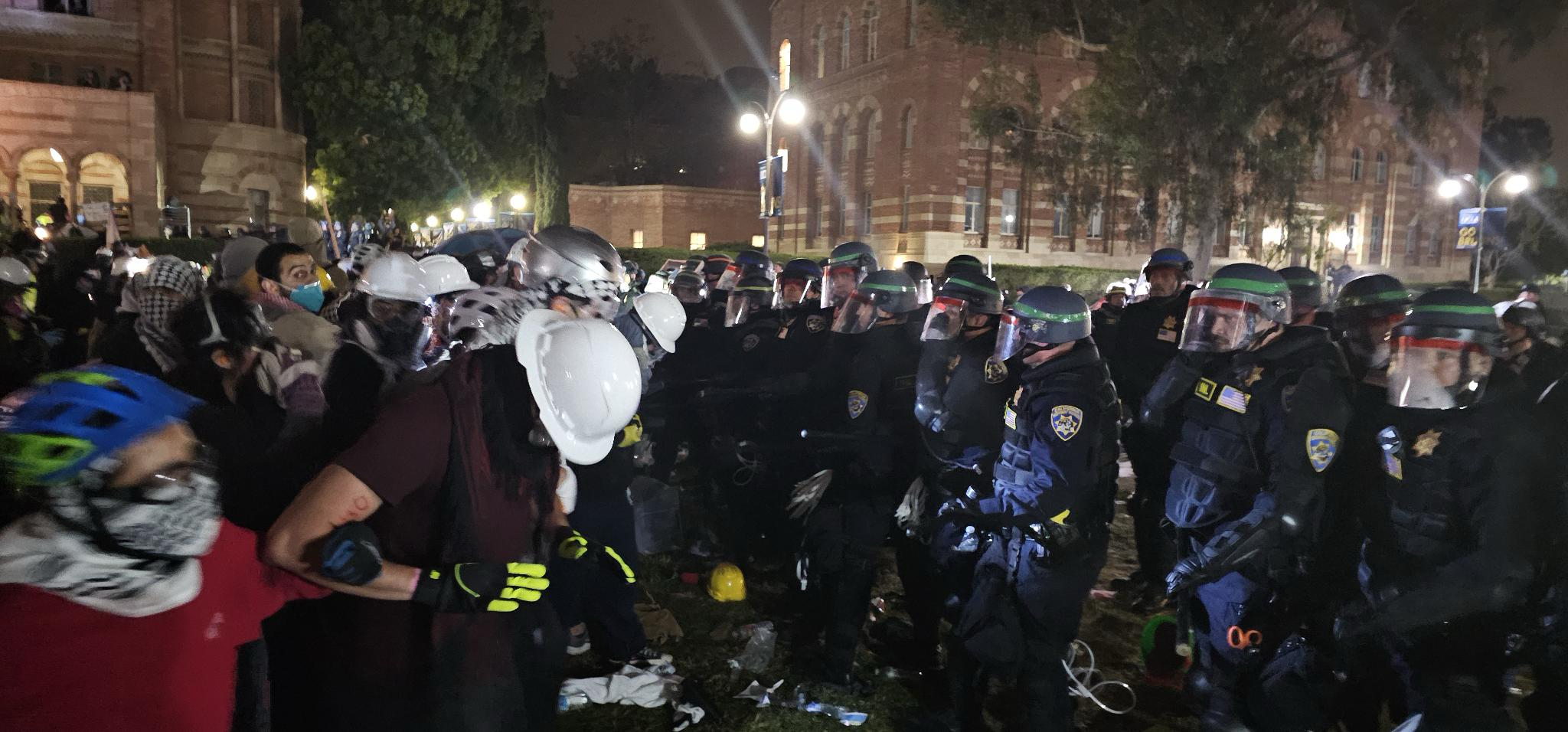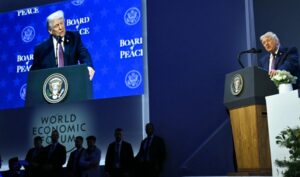
Published 02/05/2024 18:09 | Edited 05/02/2024 18:43
At least 200 people were arrested at UCLA on Thursday, bringing the national total of arrests to more than 2,000 across dozens of college campuses since police raided a camp at Columbia University in mid-2019. April, according to a count by the news agency Associated Press.
Police have eliminated protest camps at schools across the US, resulting in arrests, or have been voluntarily closed. In New York, these included the City College of New York, Fordham University, Stony Brook University, and the University of Buffalo. Others across the country included the University of New Hampshire in Durham, Northern Arizona University in Flagstaff and Tulane University in New Orleans.
College campuses in the US have long been bastions of academic freedom and political protest. But that changed on April 24, when university administrators quickly revised policies that had been in place since 1969.
“Students, teachers and community members have been gathering at this meadow for decades and we have never come across this,” said Benjamin Robinson, a professor of Germanic studies at the university who joined the protesters on April 25. He was eventually arrested, along with about 50 other protesters, all of whom were immediately banned from campus for a year.
“Now I’m seeing this militarized, overwhelming, disproportionate display of force,” Robinson said. “It makes you wonder: Why this time? Why is this time different?”
Protests and encampments continue on more than 20 campuses across the US, including New York University, Yale and Harvard. These protests also suffered police repression and violence.
Chaos in Los Angeles
Demonstrations – and arrests – took place in almost every corner of the country. But in the past 24 hours, they have drawn the most attention at the University of California, Los Angeles, where chaotic scenes unfolded on Thursday morning as police in riot gear charged into a crowd of protesters.
California Gov. Gavin Newsom denounced the delayed law enforcement response Tuesday and UCLA Chancellor Gene Block promised an investigation. The head of the University of California system, Michael Drake, ordered an “independent review of the university’s planning, its actions and the response of law enforcement authorities.”
Police removed barricades and began dismantling protesters’ fortified encampment at UCLA after hundreds of demonstrators defied orders to leave, some forming human chains as police fired flash grenades to disperse the crowd.
Sergeant Alejandro Rubio of the California Highway Patrol, citing data from the Los Angeles County Sheriff’s Department, said inmates were being booked at the county jail complex near downtown Los Angeles. UCLA police will determine if any charges should be sought.
With police helicopters hovering, the sound of flashbulbs produced a bright light and loud noise to disorient and stun. Protesters shouted at police officers: “Where were you last night?” On Tuesday night, counterprotesters attacked the UCLA camp and administration, and it took campus police hours to respond. No one was arrested, but at least 15 protesters were injured. The authorities’ lukewarm response drew criticism from political leaders, Muslim students and advocacy groups.
The protests at UCLA seemed to be getting more attention. Iranian state television broadcast live footage of the police action, as did Qatar’s pan-Arab satellite network Aljazira. Live footage from Los Angeles was also broadcast on Israeli television networks.
Pioneering in Manhattan
National demonstrations on college campuses began in Columbia on April 17 to protest Israel’s offensive in Gaza following Hamas’ deadly attack on southern Israel on October 7. Militants killed around 1,200 people, most of them civilians, and took around 250 hostages. Promising to eradicate Hamas, Israel killed more than 34,000 Palestinians in the Gaza Strip, according to the local Ministry of Health.
Tent camps of protesters calling on universities to stop doing business with Israel or with companies that say they support the war in Gaza have spread to campuses across the country in a student movement unlike any other this century. The police crackdowns that followed reflected decades-old actions against an even larger protest movement against the Vietnam War.
The Columbia chapter of the American Association of University Professors condemned Columbia University leadership on Thursday for asking New York City police to remove protesters. The chapter said that “the horrific police attack on our students” is now “shamefully on display for the entire world to see.”
On Wednesday, the activist group Jewish Voice for Peace (JVP) said it condemned the New York Police Department’s crackdown in Columbia and the City College of New York.
“It couldn’t be clearer: these students were brutalized to protect Columbia University and CCNY’s investments in Israeli apartheid,” the group said. “It will forever be a stain on Colombia that the administration called in riot police on its own student body, instead of divesting itself of the brutality of war and occupation.”
Stefanie Fox, executive director of the group, said: “America is involved in war around the world and the militarization of US police forces is a direct result. The US has financed and supported the Israeli government’s oppression of Palestinians for decades, with private institutions across the country profiting from it.”
She said Columbia was “once again on the wrong side of history,” as it was “in its oppression of the student anti-war movement of 1968, and wrong again in its oppression of the student movement against South African apartheid in 1985.” ”.
While the student groups behind the Columbia protest have not yet outlined their next steps, they have made it clear that they intend to keep their movement alive until the university agrees to their demand to divest from companies with ties to Israel.
Columbia, for its part, has made clear that it has no plans to accept these demands. The university is just days away from its annual commencement, when graduating students receive their diplomas. It is unclear whether the event will go ahead as planned or whether protesters will be able to use the occasion to make a statement.
Crowded jails
At Stony Brook University in New York, 29 people, including students, faculty and members outside the campus community, were arrested on Thursday morning. In a separate incident at Fordham University in New York City, 15 people were arrested for breaking into the lobby of a building on the Lincoln Center campus.
At the University of Texas at Dallas, 17 people were arrested on criminal trespass charges Wednesday after protesters refused to comply with orders to remove an encampment on the school’s main walkway.
At Yale, campus police arrested four people, including two students, after about 200 protesters marched to the home of the school president and the campus police department. The protest group Occupy Yale accused police of violence during arrests.
In the state of Oregon, police began clearing pro-Palestinian rights protesters from Portland State University’s Millar Library after occupying the building since Monday. University President Ann Cudd said about 50 protesters peacefully vacated, but others remained, resulting in additional police activity.
In Minneapolis, at the University of Minnesota, an agreement was reached to end an on-campus camp, ensuring that final exams and graduation ceremonies would not be interrupted. Similar agreements have been made at other institutions, such as Northwestern University and Brown University.
Outside the campuses, protests were also recorded. In Albuquerque, about two dozen protesters blocked access to the main gate of Kirtland Air Force Base in a gesture of solidarity with the situation in Gaza, promising to “shut everything down” in protest against the ongoing war in the region.
US college campuses have become a flashpoint, with school leaders facing intense scrutiny over their handling of allegations of anti-Semitism and the right to free speech. The presidents of Harvard and the University of Pennsylvania have resigned following questions at a congressional hearing about whether campus calls against the genocide of Palestinians would violate the school’s conduct policy.
With information from Aljazira and Associated Press
Source: vermelho.org.br

